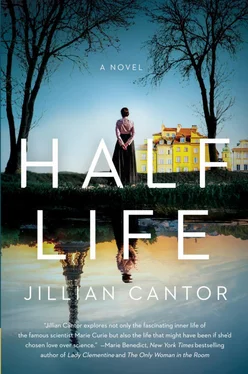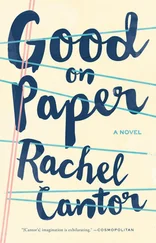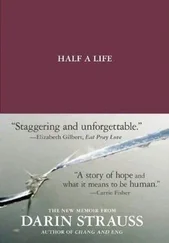I do not feel at all like that same girl, that same woman, who had been skating through life as a lovesick penniless governess, not too long ago, in Szczuki. And when I sign my registration card, instead of Marya, I write Marie . The French version of my name seems more suitable for my new life here, as a student, as a scientist. In Paris Marie can be anything or anyone. And I vow to leave that sad and listless Marya behind.
“ARE YOU AWAKE?” BRONIA’S VOICE CUTS THROUGH THE DARKNESS of my bedroom.
“Yes,” I say. “Sorry, did I wake you, Bron?” It is November third, the morning I am officially to become a student of the Faculty of Science at the Sorbonne, and I’ve been awake since the middle of the night, unable to get back to sleep, my mind and body restless, eager and excited.
“No,” Bronia says, lifting the curtain a bit now, only to reveal darkness. “I heard you rustling around in here. But it was the baby who woke me.” Bronia sighs. “Should I make some coffee?” she asks. “I’m not falling back to sleep.”
“Neither am I,” I admit. “Will we wake up Mier?”
“He’ll be fine,” Bronia says dismissively. I feel a little bad for my brother-in-law, who is kind, but also quiet—no match for the two independently minded sisters who now inhabit his apartment. Mier is short for Kazimierz, and every time Bron has said his name these past few weeks I couldn’t help but think about my own Kazimierz standing on the train platform in Warsaw. But I do not regret my choice. And besides, my brother-in-law is nothing like him. Mier’s love and adoration for Bronia are so clear on his face each time he glances at her, and he agrees to everything Bronia asks of him, anything to make her happy and fulfilled. He would never ask her to choose him over medicine, and that alone makes me quite fond of him.
Bronia leaves to start our coffee, and I rise and dress in the darkness. I don’t have many dresses to choose from, and I pull one blindly out of the wardrobe, not caring which one it is. I spent all of Papa’s rubles on my tuition and registration fees, with none left for new clothing or anything else now. I’m relying on Bronia for food and shelter. And anyway, I don’t care about how I look. As long as it covers me, any dress will do. I wrap my blond hair back into a tight bun and then walk into the dining room to share a coffee with my sister.
“Are you nervous?” Bronia asks, handing me a cup.
“Nervous? What is there to be nervous about?” I laugh, the sound coming out higher than normal, and I realize, yes, perhaps I am a bit nervous.
“You will most likely be the only woman in your physics classes today,” Bronia says matter-of-factly. “And the men will not take kindly to you doing better than them.” From the slightly bitter edge to her voice, I’m certain Bronia experienced something similar when she began her medical course a few years earlier. Though the letters she had written to me had conveyed nothing of the sort—they had been filled only with how much she’d been learning, the joy she found in all the medical knowledge and practice.
I shake my head. Who cares about the men? If I’m nervous about anything, it’s that deep down, Pani Zorawska might be right about me. That I’m not good enough, that I will never amount to anything. Perhaps the courses will be too hard or I’ll run out of money before I earn my degree. I can’t imagine how I would feel to return to Poland both penniless and also a failure.
Outside the apartment window, the sun begins to rise, and the sky glows orange and purple. I finish my coffee and take a deep breath. Nervous or not, I am more than ready. My years of self-study have taken me as far as I will ever get on my own. Now I need brilliant professors, access to laboratories. “I should leave,” I tell Bronia. “I want to arrive early.”
Bronia reaches across the table, grabs my hand and squeezes it. “Good luck, ma petite soeur .” My little sister.
I’ve been practicing my French these past few weeks: “ Merci, ma grande soeur ,” I answer back.
THE SORBONNE IS UNDERGOING A RENOVATION, WHICH IS only partway done, and as a result, the noise of men with shovels and hammers echoes off rue Saint-Jacques, and my first lecture has been relocated to an old house alongside the street. I arrive an hour before class begins, and take the chair closest to the front. The rest of the students file in after me and sit behind me inside the dusty parlor.
The professor stands directly in front of me—an older, balding man with a long white beard, dressed in a black jacket with tails, a long white tie. He looks more like he’s dressed for a dinner party than a laboratory, other than the chalk dust marking up his sleeves. His clothing is another reminder of how important, how much bigger, this class is compared to any other I’ve ever taken before. I swallow back the nervous swell in my chest, the coffee washing back up, burning the back of my throat.
He begins to call out the names of the students one by one, and when he says Marie , then terribly mispronounces my last name— Sokol—ow — ska —I don’t respond at first, not realizing he’s talking to me. A man behind me taps me on the shoulder. All eyes are upon me now, and my cheeks redden with embarrassment. Of course, everyone else knows whose name the professor is calling. Looking around, I am, as Bronia had predicted, the only woman in the room.
“ Oui, présente ,” I call out quickly, feeling the hotness from my face creep to my neck as I raise my hand. Professor Appel checks me off and moves on, calling out the names of the remaining men.
Someone whispers loud enough for me to hear: Who is that foreign woman with the beautiful hair? Foreign woman? Beautiful hair?
Another man says: A pretty little thing like her in the physics course? Is she lost?
There are snickers, but Professor ignores them, continuing to call the roll.
So I am allowed in, unlike in Poland, and yet, none of these men will take me seriously? Pretty little thing. Is that all anyone will see me as here?
My embarrassment is quickly replaced by annoyance. Bronia told me this would happen, and I’m determined now not to let it bother me, ruin my first morning of classes. I stare straight ahead, eyes eagerly trained on Professor Appel in his elegant tails, pretending there is nothing else, no one else, in this room but his voice.
Anyway, I am not here to make friends. I am here to learn, to be the best in physics. I will show them all.
Loksow, Poland, 1893
My Flying University of Loksow did indeed start small, as I had promised Kazimierz it would. It was, at first, just me and one other woman, Agata, who worked with me, cooking and cleaning for the Kaminskis. Our little university met each Wednesday night at one of our apartments, and we took turns teaching one another things we knew. Agata’s father had been a doctor before he died when she was a teenager, and she knew many things about the ways and structures of the body, while I shared with her the chemistry I had been taught at Flying University back in Warsaw. After only a few months, Agata had a friend, Emilia, who wanted to join us, and soon Emilia had a friend, too, and then another, and then by the following year, there were six of us.
Leokadia Jewniewicz was the seventh to join our school, having found us through her cousin, Joanna, and Leokadia was also the only one of us artistically inclined. She was a pianist, already performing private concerts throughout the city, and when she first came to our Wednesday night meeting, at my apartment—which really wasn’t even big enough to fit six people, much less seven—I could tell that she was different from the rest of us. And not just because of the music. Her red dress looked brand new, made with a rich, expensive fabric. And her fingers were so pretty and clean, her nails clear and shiny.
Читать дальше









